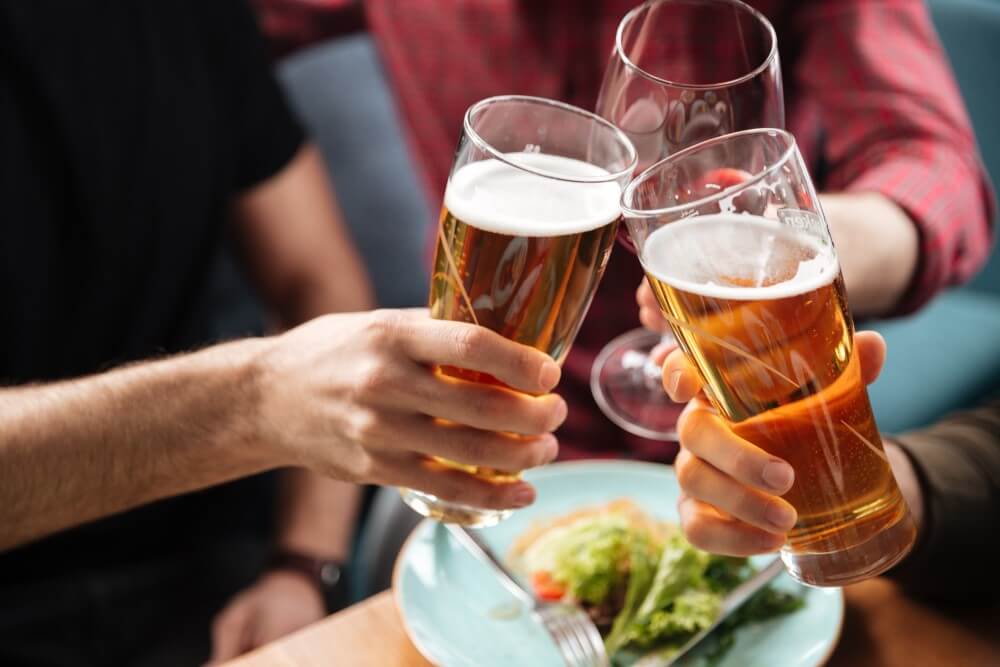
Did you know that 30% of adults in the U.S. don’t drink alcohol? Even if you’re part of that statistic, you likely have friends who enjoy a drink now and then. The question becomes, how do you support your friends without compromising your own choices? It’s not just about being a designated driver or finding non-alcoholic options; it’s about showing up and maintaining the camaraderie. You might find that there are creative ways to keep the social atmosphere alive, all while sticking to your personal values. Curious about how to balance this dynamic?
Key Takeaways
- Support your drinking friends by being present and offering non-alcoholic options.
- Be the designated driver to ensure everyone’s safety.
- Organize fun, alcohol-free activities that everyone can enjoy.
- Show respect and solidarity by participating in social events without feeling pressured to drink.
- Foster deeper connections by engaging in shared experiences and respecting each other’s choices.
The Importance of Solidarity
Solidarity with friends who drink is crucial for creating a sense of unity and support within the group. By being present and supportive, even if you choose not to drink, you show respect for your friends’ choices. This act of solidarity fosters a deeper sense of connection and loyalty.
Offering to be a designated driver or ensuring your friends’ safe journey home further demonstrates your commitment to their well-being. Engaging in non-alcoholic activities alongside those who drink can still strengthen bonds and build camaraderie.
Socializing Without Alcohol
Building on the importance of unity and support, socializing without alcohol offers numerous enjoyable and inclusive alternatives that foster strong connections. Non-alcoholic options at bars and restaurants are increasingly popular, giving you a range of tasty and creative drinks to enjoy.
Sober socializing opens the door to healthy choices, allowing everyone to participate without the pressure of drinking. Fun events like sports, games, and outdoor adventures provide great opportunities for bonding.
Respecting and supporting friends who choose not to drink for personal, religious, or health reasons strengthens your relationships. By embracing these alternatives, you ensure everyone feels comfortable and included, promoting a sense of belonging within your group.

Activities for Non-Drinkers
Exploring a variety of engaging activities can offer non-drinkers fulfilling alternatives to alcohol-centered social gatherings.
Outdoor adventures like hiking, biking, or picnicking provide opportunities for bonding while enjoying nature. Evidence suggests that these activities reduce stress and promote physical health.
Additionally, organizing game nights can foster camaraderie and create memorable experiences. Studies show that board games enhance social interaction and cognitive skills.
Attend concerts, comedy shows, or sporting events to enjoy entertainment without alcohol. Trying new hobbies together, such as cooking classes or art workshops, can also be rewarding.
These activities encourage skill-building and creativity while strengthening friendships. By integrating such alternatives, you can cultivate a sense of belonging and ensure everyone feels included.
Supporting Your Friends
Fostering a supportive environment for your friends who choose not to drink can significantly enhance their social experience and well-being. Being present at social gatherings, even if you’re not drinking, shows support and helps create a welcoming atmosphere.
Offer to be a designated driver, or enjoy non-alcoholic beverages together. By promoting moderation and looking out for signs of overconsumption, you demonstrate genuine care for their health. Respecting their decisions and offering alternative activities like hikes, movies, or games can further strengthen your bond.
Building Stronger Bonds
Shared experiences can significantly deepen friendships, especially when they’re rooted in mutual respect and understanding.
Being present for your friends, even if you don’t drink, shows friendship support and solidarity. Engaging in shared experiences like playing games or enjoying snacks creates lasting memories, reinforcing the bond between you.
Expressing care for your friends’ choices, even if they differ from yours, demonstrates understanding and respect, which are crucial for deep connections. By being a reliable and non-judgmental presence, you foster trust and closeness.
These actions make your friends feel valued and understood, enhancing the sense of belonging within your group. Building stronger bonds through these methods ensures your friendships are resilient and meaningful.
Frequently Asked Questions
Why Shouldn’t You Drink Alone?
You shouldn’t drink alone because it increases the risk of developing alcohol dependency. Drinking socially fosters connections, providing a sense of belonging and support. Social settings also promote moderation, reducing potential negative impacts of alcohol consumption.
Why Does My Friend Drink Alone?
Your friend drinks alone due to social isolation and depression, using alcohol as a coping mechanism and stress relief. They might be struggling with addiction or simply seeking solitude. Address their habits with open, honest conversations and support.
Conclusion
Imagine standing under twinkling fairy lights, laughter flowing freely, as you sip a refreshing mocktail. Your presence alone speaks volumes.
By embracing non-alcoholic activities, being the reliable designated driver, and promoting moderation, you foster a supportive environment. This approach strengthens friendships, showing that you care deeply about your friends’ choices and well-being.
Remember, solidarity isn’t just about shared drinks; it’s about creating memories and bonds that last a lifetime, rooted in mutual respect and understanding.

0 Comments